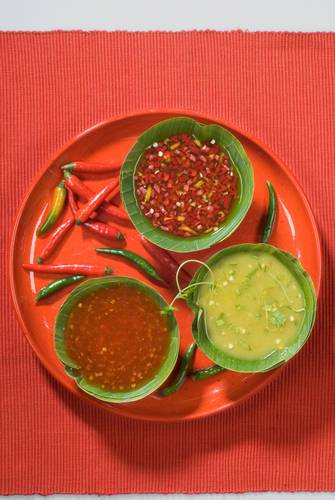I have to admit, I am a hot sauce aficionado. Not the wimpy stuff you can get at the local supermarket, but those produced from peppers at the top of the Scoville scale. Habanero, Red Savina, and Bhut Jolokia peppers (a few notches below U.S. grade pepper spray) are used to make extreme hot sauce, many of which have warning labels on them. I know, sick.
I can confirm that over-the-top hot sauce consumption can make one run to a particular room in their home. However, can it also make one run FASTER to that destination?
Believe it or not, a study at Virginia Tech University was performed to determine the effects of capsaicin (the active “hot” component of peppers) on repeated sprinting performance. It was based on previous research that showed capsaicin had physiological and metabolic effects that could influence exercise performance and inflammation. Their goal, therefore, was to investigate if capsaicin influenced not only sprint performance, but also interleukin-6 (a protein that has both pro- and anti-inflammatory qualities).
“Hey, what the heck, this stuff burns your mouth, so let’s see if helps you burn up the track!”

Here are the study details
- Nineteen experienced male athletes, age 18–30 years, participated in a placebo-controlled crossover study.
- During one trial, they consumed 25.8 mg·d−1 of capsaicin and the other a placebo.
- After the supplementation period, they completed a repeated sprint test consisting of 15 x 30-meter maximal effort sprints on every 35 seconds. Their time was measured with an electronic dual-beam timing system.
- Fasted blood draws for interleukin-6were taken at baseline before supplementation, 45 minutes before the sprint test, and immediately after.
- Rate of perceived exertion, muscle soreness, and gastrointestinal distress for 5 symptom subscales were measured at 1-minute pre-test, during, posttest, and 1-minute post-test.
- The muscle soreness was also measured for 3-day post-test.
- Regarding the placebo group, capsaicin significantly increased the total ratings of gastrointestinal distress symptoms by 6.3-fold.
- There was no difference between treatments in fastest or mean sprint time, fatigue, interleukin-6response, rate of perceived exertion, or muscle soreness.
Their conclusions: capsaicin did not improve repeated sprint performance or the interleukin-6response but did cause significant gastrointestinal distress. Capsaicin CAP is not recommended for athletes involved in repeated sprinting.
Needless to say, do the math. Work on your sprinting ability by practicing sprinting, getting stronger, staying lean, and avoiding capsaicin as a part of your workouts. Save the hot sauce consumption for lunch and dinner.






